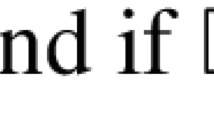Abstract
Bradley has argued that a truth-conditional semantics for conditionals is incompatible with an allegedly very weak and intuitively compelling constraint on the interpretation of conditionals. I argue that the example Bradley offers to motivate this constraint can be explained along pragmatic lines that are compatible with the correctness of at least one popular truth-conditional semantics for conditionals.
Similar content being viewed by others
References
Adams, E. W. (1975). The Logic of Conditionals. Dordrecht: Reidel.
Bach, K. (2005). Context ex machina. In Z. Gendler Szabó (Ed.), Semantics versus pragmatics. Oxford: Oxford University Press, pp. 15–44.
Bradley, R. (2000). A preservation condition for conditionals. Analysis, 60, 219–222.
Douven, I. (2002). A new solution to the paradoxes of rational acceptability. British Journal for the Philosophy of Science, 53, 391–410.
Douven, I. (2007a). Kaufmann on the probabilities of conditionals. Journal of Philosophical Logic, in press.
Douven I. (2007b). Fitch’s paradox and probabilistic antirealism. Studia Logica, in press
Douven, I., & Williamson, T. (2006). Generalizing the lottery paradox. British Journal for the Philosophy of Science, 57, 755–779.
Gärdenfors, P. (1975). Qualitative probability as an intensional logic. Journal of Philosophical Logic, 4, 171–185.
Green, M. S. (1998). Direct reference and implicature. Philosophical Studies, 91, 61–90.
Grice, H. P. (1989a). Logic and conversation. In H. P. Grice (Ed.), Studies in the way of words. Cambridge MA: Harvard University Press, pp. 22–40.
Grice H. P. (1989b). Indicative conditionals. In H. P. Grice (Ed.), Studies in the way of words. Cambridge MA: Harvard University Press, pp. 58–85.
Hájek, A. (2003). What conditional probability could not be. Synthese, 137, 273–323.
Howson, C. (2000). Hume’s problem: Induction and the justification of belief. Oxford: Clarendon Press.
Jackson F. (1979). On assertion and indicative conditionals. Philosophical Review, 88, 565–589.
Kaufmann, S. (2004). Conditioning against the grain. Journal of Philosophical Logic, 33, 583–606.
Kemeny, J. (1955). Fair bets and inductive probabilities. Journal of Symbolic Logic, 20, 263–273.
Levinson, S. (1983). Pragmatics. Cambridge: Cambridge University Press.
Lewis, D. K. (1976). Probabilities of conditionals and conditional probabilities. Philosophical Review, 85, 297–315.
Meyer, J.-J., van der Hoek, W. (1995). Epistemic logic for AI and computer science. Cambridge: Cambridge University Press.
Milne, P. (1991). A dilemma for subjective Bayesians—and how to resolve it. Philosophical Studies, 62, 307–314.
Récanati F. (2003). Embedded implicatures. Philosophical Perspectives, 17, 299–332.
Soames, S. (2003). Philosophical analysis in the twentieth century: The age of meaning (Vol. II). Princeton: Princeton University Press.
Sobel, J. H. (1987). Self-doubts and Dutch strategies. Australasian Journal of Philosophy, 65, 56–81.
Acknowledgements
I am greatly indebted to Richard Bradley, Raf De Clercq, Kevin Demiddele, Jan Heylen, Leon Horsten, Christopher von Bülow, and two referees for this journal for valuable comments. Versions of this paper have been presented at the University of Leuven and at Erasmus University Rotterdam. I am grateful to the audiences on those occasions for their stimulating questions and remarks.
Author information
Authors and Affiliations
Corresponding author
Rights and permissions
About this article
Cite this article
Douven, I. On Bradley’s preservation condition for conditionals. Erkenntnis 67, 111–118 (2007). https://doi.org/10.1007/s10670-007-9043-4
Received:
Accepted:
Published:
Issue Date:
DOI: https://doi.org/10.1007/s10670-007-9043-4



